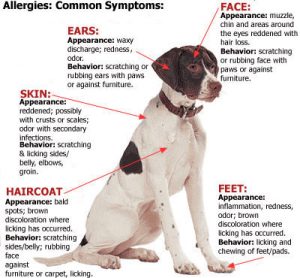What to Do When Your Pet Has Allergies

Pets Have Allergies, Too

Many animal lovers don't know the signs of pet allergies because dogs and cats show different reactions to some of the same things we're allergic to. Grass pollen, for example, makes lots of people sneeze and experience watering eyes. That same pollen, it turns out, can make a dog's feet itch.
Depending on the type of allergy, your pet may exhibit different symptoms. Although pets occasionally exhibit watery eyes and some sneezing, the most common reaction is scratching. Constant scratching may lead to raised infected welts, open sores, and loss of hair. Ear infections are also common in dogs with allergies.
Pets who are affected by allergies may suffer their entire lives; typically symptoms worsen as they get older. We can help alleviate some of that suffering by knowing the signs of allergies and finding the right type of product relief for the symptoms. Types of Allergies That Affect Pets There are many types of allergies that can affect your pet. Environmental allergens that are inhaled or come into contact with the skin can cause allergies known as atopy. Common sources are pollens, molds, and dust mites.
Allergies that result from flea bites are referred to as flea allergy dermatitis. Certain allergies occur from items your pet ingests, and are typically called food allergies. Contact allergies are caused by something your pet comes in direct contact with, such as carpet fibers, plastics, and other things. Contact allergies are less common than atopy and flea allergy dermatitis in pets.

The most obvious way to tell if a dog has allergies is if the dog is constantly scratching, either in one spot or all over their body. Other symptoms include coughing, sneezing, runny eye or nose discharge, vomiting and diarrhea.
If you suspect your dog is experiencing allergy symptoms, Carolina Ranch can help. We can help determine what your dog is allergic to and how best to treat it, giving your pup some much needed relief. Contact us online today to schedule an appointment or to learn more! Yes, dogs can suffer from seasonal allergies. In Garner in the spring, for instance, we get high tree pollen counts. Dogs can be affected by tree pollen, as well as ragweed and dust mites. These allergens, also known as atopy, are environmental and are inhaled or come into contact with the dog’s skin, causing an allergic reaction.
Contact Carolina Ranch online today to schedule an appointment or to learn more about allergies and your pet. What can you give a dog with allergies near Garner NC? Some common allergy treatments for dogs include:
- Antihistamines - There are prescription and over-the-counter antihistamines that can be given to dogs to help with allergy symptoms. Make sure to consult with your veterinarian first before administering medicine.
- Hypo-Allergenic Shampoos and Wipes - These products are helpful in cleaning your dog without irritating their skin.
- Supplements - Some dogs respond well to fish oil supplements for skin care.
- Prescription Topical and Oral Treatments - Your veterinarian will determine if any prescription medicine would work well to treat your dog’s symptoms.
- Allergy Shots - Allergy shots are beneficial for dogs that do not respond well to oral medications.
The most obvious way to tell if a dog has allergies is if the dog is constantly scratching, either in one spot or all over their body. Other symptoms include coughing, sneezing, runny eye or nose discharge, vomiting and diarrhea.
If you suspect your dog is experiencing allergy symptoms, Carolina Ranch can help. We can help determine what your dog is allergic to and how best to treat it, giving your pup some much needed relief. Contact us online today to schedule an appointment or to learn more!
Yes, dogs can suffer from seasonal allergies. In Garner in the spring, for instance, we get high tree pollen counts. Dogs can be affected by tree pollen, as well as ragweed and dust mites. These allergens, also known as atopy, are environmental and are inhaled or come into contact with the dog’s skin, causing an allergic reaction.
Contact Carolina Ranch online today to schedule an appointment or to learn more about allergies and your pet.
Some common allergy treatments for dogs include:
- Antihistamines - There are prescription and over-the-counter antihistamines that can be given to dogs to help with allergy symptoms. Make sure to consult with your veterinarian first before administering medicine.
- Hypo-Allergenic Shampoos and Wipes - These products are helpful in cleaning your dog without irritating their skin.
- Supplements - Some dogs respond well to fish oil supplements for skin care.
- Prescription Topical and Oral Treatments - Your veterinarian will determine if any prescription medicine would work well to treat your dog’s symptoms.
- Allergy Shots - Allergy shots are beneficial for dogs that do not respond well to oral medications.
Do you have questions on how to treat your pet’s allergies? Contact Carolina Ranch online today to schedule an appointment or to speak with one our knowledgeable vet technicians.
Dog allergies are caused by an hypersensitivity of the immune system to proteins from plants, insects, animals or foods. Some common dog allergies stem from:
- Pollen
- Mold spores
- Dust mites
- Shed skin cells
- Insects, like fleas
- Medications
- Foods
Allergies are actually pretty common in dogs. Carolina Ranch can help determine if your dog is suffering from an allergy and how best to treat it, giving your furry friend some much needed relief. Contact us online today to schedule an appointment or to learn more!
Do you have questions on how to treat your pet’s allergies? Contact Carolina Ranch online today to schedule an appointment or to speak with one our knowledgeable vet technicians. Dog allergies are caused by an hypersensitivity of the immune system to proteins from plants, insects, animals or foods. Some common dog allergies stem from:
- Pollen
- Mold spores
- Dust mites
- Shed skin cells
- Insects, like fleas
- Medications
- Foods
Allergies are actually pretty common in dogs. Carolina Ranch can help determine if your dog is suffering from an allergy and how best to treat it, giving your furry friend some much needed relief. Contact us online today to schedule an appointment or to learn more! Atopy is the most common form of allergy in dogs and cats. Atopy is often seasonal. If a pet is allergic to ragweed, symptoms occur in the fall. Pets who are allergic to spring tree pollen will show signs in April and May. If a pet is allergic to dust mites, the symptoms may be most dramatic in the winter, when more time is spent inside. Signs of atopy include:
- Chewing at the feet
- Constant licking of the flank (side) and groin area
- Rubbing of the face
- Inflamed ears or recurrent ear infections
- Recurrent hot spots in dogs and pinpoint facial scabbing in cats
Asthma-like wheezing and respiratory problems (more likely in cats) Less common allergies include contact dermatitis, which include allergies to carpets, cleaners, or plastic. These allergies may cause:
- Red itchy bumps or blisters on sparsely-haired areas of the skin and those exposed to the allergen such as the belly, feet, or muzzle
- Intense scratching
Hair loss (in chronic conditions) Food allergies account for about 10-15% of all allergies in dogs and cats. Food allergies may show up concurrently with allergies to pollen, dust, etc. Symptoms include:
- Itching, especially face, feet, trunk, limbs and anal area
- Ear problems, often yeast-related
- Skin infections that respond to antibiotics, but then recur as soon as the antibiotic therapy ceases
Occasionally, dogs with true food allergies may have increased bowel movements and soft stool. Food allergies should not be confused with food intolerances, which are not true allergies, and generally cause diarrhea and vomiting. Watching your pet go through the misery of allergy symptoms can be miserable in itself. If you suspect your pet has allergies, visit your veterinarian. The type of allergy and severity of the symptoms will determine how your veterinarian decides to treat them. Could You Be Allergic Also? Here for Info




